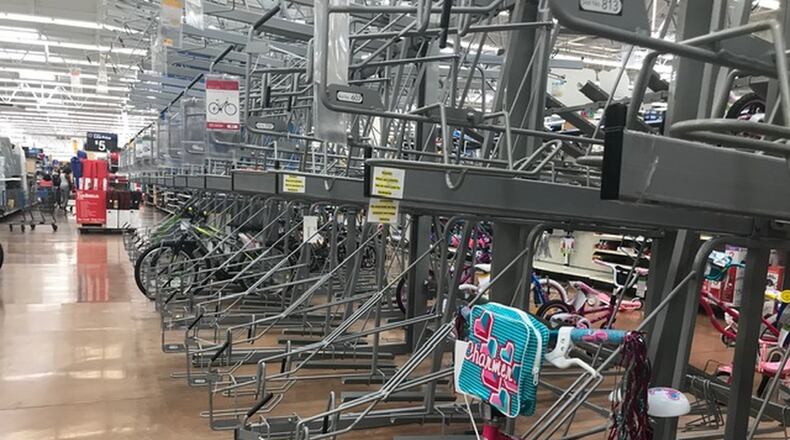The COVID-19 pandemic has forced people to look for healthy ways to spend their time while creating, for some, a wariness of public transit.
As the pandemic tightened its grip, health clubs closed, sports seasons were cancelled and children were kept home from school.
Consequently, retailers across the nation, large and small, are finding it a challenge to keep bikes in stock.
RETAIL: Morris pushes through the pandemic to new furniture showroom openings
Chris Tegtmeyer, manager of Kettering Bike Shop, said bicycle production in Asia was shut down for some 10 weeks earlier this year, compounding the problem.
“Our manufacturers have told us that this will not straighten out until potentially spring of next year,” Tegtmeyer said.
It’s not just bikes. Nearly all outdoors sporting equipment is in strong demand right now, he and others say.
Soccer and hockey goals and nets generated a combined $13.5 million in sales for March, a 38% increase over the previous year, according to retail data tracker NPD Group. Sales of golf nets and screens rose by 144%, and sales of basketball hoop sets grew by 110%, NPD said.
“I hear that kayaks are just the same thing, non-existent right now,” Tegtmeyer said.
Normally, Kettering Bike Shop staffers speak with customers face to face about what they’re looking for. But today, with social distancing still a priority, the business usually starts with a phone consultation to see if a bike a customer wants is even in stock.
“If we don’t have product, then we have a waiting list that we are taking names on, because we have orders in place for product that will continue to come in, through the summer and into the fall,” Tegtmeyer said.
Joe Stiffler, owner of Huber Heights Bicycles, often finds himself telling customers to call back “in a couple of weeks.”
Stiffler had all of six new bikes in stock as of Wednesday last week. Normally, he has about 100 bikes in stock, ready to sell.
“It’s not a good problem,” Stiffler said. “I mean, basically as a society we’re not used to being told that we can’t get product. And that’s one of the issues I have, and also one of the issues I have with telling customers.”
A Walmart executive said bike sales have been stronger with the onset of warm weather.
Credit: Jessica Hansbauer
Credit: Jessica Hansbauer
“We have been enjoying serving customers with their bike and bike accessory needs throughout these difficult times,” Reid Thornton, Walmart senior buying manager-wheels, said in an email. “Our customers want to get outside of the house and exercise and enjoy sunshine with the entire family.”
Stiffler sells what he calls “meat and potatoes” cycles, basically priced from $400 to $700.
He agreed that the Asian supply chain on which many U.S. retailers rely was shut down for more than two months. “Nothing was being produced or shipped or anything.”
“There are probably five or ten different reasons why we can’t get bikes right now,” Stiffler added.
“Consumers are looking for outdoor- and kid-friendly activities to better tolerate the challenges associated with stay-at-home orders, and cycling fits the bill well,” Dirk Sorenson, sports industry analyst at NPD, said in a statement. “Growth is stemming largely from children’s, BMX, and adult leisure bikes that carry a more approachable price-point than some of the more expensive bike styles that were selling well prior to the COVID-19 crisis.”
Added Sorenson: “Ultimately, more people are likely riding today than in years past.”
Stiffler expects what he called an “accordion effect” that will make bikes relatively scarce for the foreseeable future.
“They’re going to go out as fast they came in, and we’re going be out of bikes again,” he said.
About the Author



